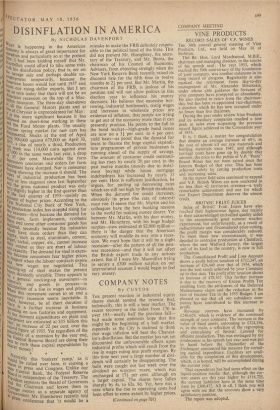DISINFLATION IN AMERICA
DAVENPORT
n ii°1Tly is always of great importance for ii,„acives and particularly so at the present 1 had been kidding myself that Mr. wit"ehnan could afford to take some risks h. - "is disinflation policy, that is, err on erne..isavage side and perhaps double un- atelrment temporarily, because the I;"ertean boom would last until 1957 and lins'e,st our rising dollar exports. But I am A' so sure today that there will not be an erican recession on the top of a Mac- , Ian recession. The three-day shut-down t; all the General Motors plants and at it (.? of Chrysler is unprecedented for May: ts the more significant because it has ;loWed on short-time working in these b"d the Ford Motor plants. The usually PaaYant spring market for new cars has tvPneared. Stocks at the end of April inesrse 900,000 against 679,000 on April 30, a rise of nearly a third. Production 11.,' Week was 110,000 units against over otf,000 in the same week last year, a drop ti 37 per cent. Meanwhile the farm ePtession continues and orders for farm ilquniPinent have slumped. Nor is consumer njing showing the increase it should. The
ex of industrial production has been Nor
andetor less stagnant since last September ver, h,,e gross national product was only :,,stightly higher in the first quarter than ne "le last quarter of 1955—mainly on pieount of higher prices. According to the hi thr.st National City Bank of New York, tw;Production index has stopped rising for Its reasons—first because the demand for ob. rears, farm implements, synthetic hp and some other consumer goods has Wheg'ecl, secondly because the industries Which, more orders than they can elY, such as steel, aluminium, cement, t43.er, nickel, copper, etc., cannot increase 40,1,r output as they are short of labour eanacity. The demand for steel is exces- veA because consumers fear higher prices anclligust when the labour contracts expire stoppnew wages are negotiated. This bng-up of steel makes the present be'th decidedly unstable. There appears to a 'nate*general stocking-up movement—in anti . 411s and goods in process—in NeMation of a rise in wages and prices. te en this movement comes to an end a
nino
rakrY recession seems inevitable. It there-, however, be of short duration if %Pend; Is a further increase in business At th'ng on new factories and equipment. equi e moment expenditures on plant and Yearl3Ment are estimated at $35 billion this reeo',,an increase of 22 per cent. over the hos,dri,"„figure of 1955. Yet regardless of the Ilie'FititY of a recession by the year end, best ederal Reserve Board are doing their de, to curb these capital expenditures by 4rer money!
wolluiadturallY this 'bankers' ramp,' as it storn, .be called over here, is causing a evyr;" In press and Congress. Unlike our hoard Central Bank, the Federal Reserve Pre is independent of the Treasury. The aupdieknt appoints the Board of Governors lib "Le Chairman and leaves them to Co-liv,sage Money as a separate agency of r,,`Inment. Mr. Eisenhower recently told v'esS conference that 'it would be a mistake to make the FRB definitely respon- sible to the political head of the State. This did not prevent Mr. Humphrey, the secre- tary of the Treasury, and Mr. Burns, the chairman of his Council of Economic Advisers, from objecting strongly when the New York Reserve Bank recently raised its discount rate for the fifth time in twelve months to 2/ per cent. But Mr. Martin, the chairman of the FRB, is jealous of his position and will not allow politics in this election year to influence his money decisions. He believes that excessive bor- rowing, industrial bottlenecks, rising wages and increases in wholesale prices are evidence of inflation, that people are trying to get out of the economy more than it can presently produce. He points to the fall in the bond market—high-grade bond issues are now on a 3/ per cent. to 4 per cent. yield basis—as proof that the demand for loans to finance the huge capital expendi- ture programmes of private businesses is running ahead of the supply of savings. The amount of consumer credit outstand- ing has risen by nearly 20, per cent. in the past twelve months (mostly due to instal- ment buying) while house mortgage indebtedness has 'increased by nearly 15 per cent. Here is sufficient justification, he argues, for putting up borrowing rates which are still not high by British standards. When the demand for credit increases, obviously its price (the rate of interest) must rise. It seems that Mr. Martin and his colleagues have the best banking reasons in the world for making money dearer. Yet between Mr. Martin, with his dear money, and Mr. Humphrey, with his huge budget surplus—now estimated AS2,000 n?illion- there is the danger that the American economy will muddle its way into a reces- sion. We must hope that it will be a slight recession—after the pattern of all the post- war recessions—and that it will not affect the British export trade to any serious extent. But if I were Mr. Macmillan trying to secure a £300 million surplus on our international account I would begin to feel very uneasy.


































 Previous page
Previous page